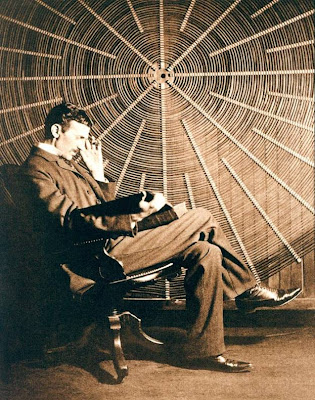THE WIZARD
“It is not a dream, it is a simple feat of scientific electrical engineering, only expensive — blind, faint-hearted, doubting world! [...] Humanity is not yet sufficiently advanced to be willingly led by the discoverer's keen searching sense. But who knows? Perhaps it is better in this present world of ours that a revolutionary idea or invention instead of being helped and patted, be hampered and ill-treated in its adolescence — by want of means, by selfish interest, pedantry, stupidity and ignorance; that it be attacked and stifled; that it pass through bitter trials and tribulations, through the strife of commercial existence. So do we get our light. So all that was great in the past was ridiculed, condemned, combatted, suppressed — only to emerge all the more powerfully, all the more triumphantly from the struggle."
2
“Fights between individuals, as well as governments and nations, invariably result from misunderstandings in the broadest interpretation of this term. Misunderstandings are always caused by the inability of appreciating one another's point of view. This again is due to the ignorance of those concerned, not so much in their own, as in their mutual fields. The peril of a clash is aggravated by a more or less predominant sense of combativeness, posed by every human being. To resist this inherent fighting tendency the best way is to dispel ignorance of the doings of others by a systematic spread of general knowledge. With this object in view, it is most important to aid exchange of thought and intercourse.”
3
“Everyone should consider his
body as a priceless gift from
one whom he loves above all, a
marvelous work of art, of
indescribable beauty, and
mystery beyond human conception, and so delicate that
a word, a breath, a look, nay, a
thought may injure it.”
4
“As I uttered these inspiring words the idea came like a flash of lightning and in an instant the truth was revealed. I drew with a stick on the sand the diagram shown six years later in my address before the American Institute of Electrical Engineers, and my companion understood them perfectly. The images I saw were wonderfully sharp and clear and had the solidity of metal and stone, so much so that I told him, "See my motor here; watch me reverse it." I cannot begin to describe my emotions. Pygmalion seeing his statue come to life could not have been more deeply moved. A thousand secrets of nature which I might have stumbled upon accidentally, I would have given for that one which I had wrested from her against all odds and at the peril of my existence ...”
“Nature may reach the same result in many ways. Like a wave in the physical world, in the infinite ocean of the medium which pervades all, so in the world of organisms, in life, an impulse started proceeds onward, at times, may be, with the speed of light, at times, again, so slowly that for ages and ages it seems to stay, passing through processes of a complexity inconceivable to men, but in all its forms, in all its stages, its energy ever and ever integrally present. A single ray of light from a distant star falling upon the eye of a tyrant in bygone times may have altered the course of his life, may have changed the destiny of nations, may have transformed the surface of the globe, so intricate, so inconceivably complex are the processes in Nature. In no way can we get such an overwhelming idea of the grandeur of Nature than when we consider, that in accordance with the law of the conservation of energy, throughout the Infinite, the forces are in a perfect balance, and hence the energy of a single thought may determine the motion of a universe.”
6
“When we speak of man, we have a conception of humanity as a whole, and before applying scientific methods to the investigation of his movement we must accept this as a physical fact. But can anyone doubt to-day that all the millions of individuals and all the innumerable types and characters constitute an entity, a unit? Though free to think and act, we are held together, like the stars in the firmament, with ties inseparable. These ties cannot be seen, but we can feel them. I cut myself in the finger, and it pains me: this finger is a part of me. I see a friend hurt, and it hurts me, too: my friend and I are one. And now I see stricken down an enemy, a lump of matter which, of all the lumps of matter in the universe, I care least for, and it still grieves me. Does this not prove that each of us is only part of a whole?
For ages this idea has been proclaimed in the consummately wise teachings of religion, probably not alone as a means of insuring peace and harmony among men, but as a deeply founded truth. The Buddhist expresses it in one way, the Christian in another, but both say the same: We are all one. Metaphysical proofs are, however, not the only ones which we are able to bring forth in support of this idea. Science, too, recognizes this connectedness of separate individuals, though not quite in the same sense as it admits that the suns, planets, and moons of a constellation are one body, and there can be no doubt that it will be experimentally confirmed in times to come, when our means and methods for investigating psychical and other states and phenomena shall have been brought to great perfection. Still more: this one human being lives on and on. The individual is ephemeral, races and nations come and pass away, but man remains. Therein lies the profound difference between the individual and the whole.”



No comments:
Post a Comment